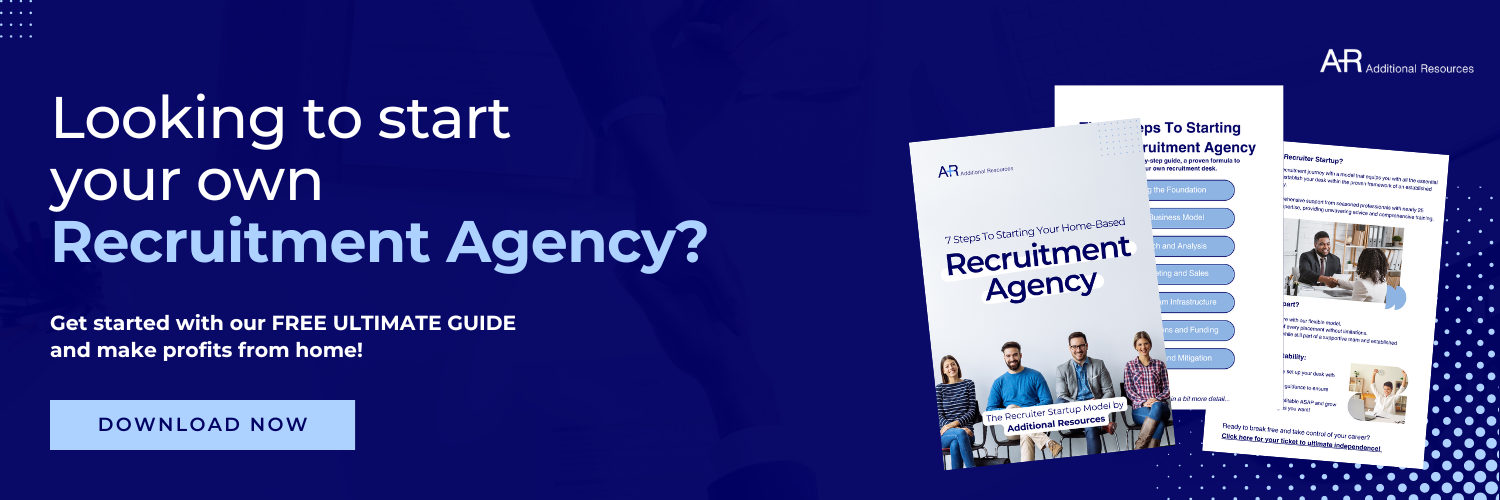So you want to become a recruiter but aren’t sure of the best career path?
Don’t worry; this guide offers a detailed employment agency vs. recruitment agency comparison to help you choose the option that suits you better. We understand you’re at crossroads and need to make an ultimate yet meaningful career decision. This article will give you the lowdown on what each offers and help determine which path is better for your goals.
Employment Agency vs. Recruitment Agency: A Tabular Summary
Here’s a quick comparison between an employment agency and a recruitment agency based on set criteria.
| Criteria | Employment Agency | Recruitment Agency |
| Job Types | Employment agencies focus on temporary and temp-to-hire roles. | Recruitment agencies specialise in finding candidates for direct hire, full-time positions. |
| Compensation | Employment agencies often charge flat fees, which may result in lower incentives for finding high-quality candidates. | Recruitment agencies typically offer higher compensation since they earn a percentage of the candidate’s first-year salary. |
| Support and Training | Employment agencies may have fewer resources and support systems in place. | Recruitment agencies generally provide more support and training for their recruiters, offering leads, resources, and access to proprietary technology platforms. |
| Work Environment | Employment agencies may offer more stability and structure but less flexibility with work station. | Recruitment agencies often provide more flexibility, including the option to work remotely. |
What Do Employment Agencies and Recruitment Agencies Do?
Before we get started, let’s answer the following questions:
How do employment agencies work, and how do recruitment agencies work?
Employment agencies, also known as staffing agencies, focus on temporary and temp-to-hire roles. They hire candidates to fill short-term jobs, like seasonal work over the holidays or maternity leave coverage. Employment agencies handle payroll, benefits, and HR duties for the candidates they place.
Recruitment agencies, on the other hand, specialise in finding candidates for direct hire, full-time positions. They work with companies to fill permanent job openings in their organisation. Recruitment agencies don’t employ the candidates directly; instead, their goal is to match qualified candidates with companies looking to make a hire.

As a recruiter, working for a recruitment agency means you can build long-term relationships with clients and candidates. You get to be a part of helping companies grow by finding critical new hires. The roles you work to fill are more meaningful, and placements tend to be more rewarding.
While employment agencies certainly have an essential role in the job market, recruitment agencies are where the exciting, high-impact work occurs. If you’re looking to start a career as a recruiter, a recruitment franchise/agency like Recruiter Startup is the perfect place to begin. We provide you with the training and tools to hit the ground running, adequate job openings to work on, and the chance to grow your recruitment desk.
What are you waiting for?
A career as a recruiter at a recruitment agency could be just the opportunity you’ve been looking for!
The Pros and Cons of Working for an Employment Agency vs. Recruitment Agency
Working for an employment or recruitment agency, each has pros and cons. As someone looking to get into recruiting, here are some things to consider with each option:

Employment Agency
An employment agency, or a staffing agency, helps place candidates in temporary, temp-to-hire and direct-hire jobs.
Pros:
- Typically offers a steady salary and benefits.
- They handle the client acquisition and job posting process for you.
- It can be a good option if you want job security.
Cons:
- Often have to work onsite at the agency office.
- Usually have less flexibility and control over which jobs and clients you work with.
- Commissions and bonuses may also be lower.
Recruitment Agency
A recruitment agency, or an executive search or headhunting firm, helps companies recruit candidates for direct hire, high-level positions.
Pros:
- Usually allows working remotely.
- The flexibility to choose which jobs and clients you work with.
- Higher earning potential through commissions and bonuses.
- You gain valuable experience finding and placing candidates.
Cons:
- Typically have to build your own candidate network.
Which Should You Go for?
Working for a recruitment agency likely means higher risk but higher reward. You can earn much more, and with a partner like Recruiter Startup, you have a higher chance of securing clients. An employment agency, on the other hand, offers more stability but less flexibility and control.
Your choice ultimately depends on your experience level, risk tolerance, and goals. A recruitment agency could be advantageous if you want broad recruiting experience and are willing to hustle to build a client base. On the other hand, an employment agency may be better if you prefer more stability and structure as you learn the ropes.
Ultimately, both options can lead to a successful and fulfilling career as a recruiter. But think carefully about which environment and work style suits you best.
Why Professionals Prefer to Work for Recruitment Agencies
If you do an adequate study on employment agency vs. recruitment agency, you’re likely to lean towards the latter for several reasons. For one, recruitment agencies focus on matching candidates with positions in their expertise. This targeted approach means they can open up more career opportunities for you as a recruiter.

Generally, a recruitment agency has the following benefits:
- Access to more specialised roles
- Higher fees and commissions
- Valuable industry insight
- Better support and training
- Opportunity for career growth
Access to More Specialised Roles
Recruitment agencies specialise in a particular industry or job function. This means they can access roles that match your expertise as a recruiter.
For example, if you recruit software engineers, setting up your desk as a tech-focused recruiter means you’ll have many more software engineering jobs to work on than a generalist employment agency. More job openings in your niche equal opportunities to place great candidates and build your success.
Higher Fees and Commissions
Because recruitment agencies attract both candidates and companies within a particular specialised field, they can charge higher fees. As a recruiter working with a recruitment franchise/agency like Recruiter Startup, you earn the lion’s share (80–90%) of the fees from each placement.
Higher fees mean higher commissions and more significant earning potential for you. At Recruiter Startup, we offer recruiters very generous commission structures with no caps on earnings. You may check out what others are saying about us.
Valuable Industry Insight
Working within a specialised recruitment agency exposes you to crucial insights into your industry. You’ll learn what skills and experience are most in-demand, new emerging tools or certifications, salaries and job titles trends, and more.
This knowledge helps you become a better recruiter and strengthens your ability to match candidates to the right roles. You’ll also gain a professional network within your industry that can lead to new job openings and candidate referrals.
Better Support and Training
Recruitment agencies usually provide more support and training for their recruiters. At Recruiter Startup, we offer leads, resources for improving your skills, and access to our proprietary technology platform. This comprehensive support system helps recruiters advance their careers and build successful businesses.
Opportunity for Career Growth
Once you’ve established yourself as a top-performing recruiter, recruitment agencies often provide opportunities for career progression. You may be able to move into a senior or leadership role, manage a team of recruiters, or even become a director or executive within the agency. An employment agency typically doesn’t offer the same potential for growth within the organisation.
***
For recruiters looking to build a thriving business, recruitment agencies offer some compelling benefits over the employment agency model. With access to specialised roles, higher commissions, industry insight, and career growth opportunities, recruitment agencies empower recruiters to achieve their full potential. Start your recruitment agency from home today when you sign up on Recruiter Startup.
How to Get Started With a Career at a Recruitment Agency
So you’ve decided you want to become a professional recruiter. Great!
The next big question is where you want to work: employment agency vs. recruitment agency.
If you want flexibility and the potential for higher pay, a recruitment agency is probably your best bet.
Here are seven steps to get started with your career at a recruitment agency:
- Build your knowledge: Study the industry and roles you want to recruit for. Learn effective interviewing and candidate assessment techniques. The more you know, the more valuable you’ll be to clients and candidates.
- Define your niche: Do you want to focus on IT, healthcare, finance, or something else? Developing expertise in a niche field will help you be more successful.
- Create a business plan: Map out how to find new clients, source great candidates, and make placements. Determine fees and billing structures and build a marketing plan to promote your services.
- Build your network: Connect with people in your target industry and roles. Join relevant LinkedIn groups and start engaging with people. Look for opportunities to help others and make authentic connections. Your network will be crucial to success.
- Land your first clients: Reach out to companies in your niche and pitch your services. Explain the value you can provide by saving them time and helping them find top talent. Offer a trial period or placement guarantee to build trust.
- Source strong candidates: Post jobs, network, check resume databases, and tap into your network. Be very selective, only choosing candidates who are an excellent fit for the role and company culture.
- Make the match: Help your clients interview and assess candidates, then guide them to make an offer to the best fit. Celebrate your success, and ask for referrals to find new clients and candidates.
With hard work and persistence, you can build a thriving career as a recruiter at an agency. The good news is that we can help you get started without the hassles, keeping your costs low; get in touch with us to learn more. And don’t forget to keep learning, improving your skills, and maintaining solid relationships; you’ll make excellent placements in no time!
Frequently Asked Questions
Do recruitment agencies directly employ?
No, recruitment agencies typically don’t directly employ candidates themselves. Instead, they act as intermediaries between job seekers and employers. They help match candidates with suitable job openings and facilitate the hiring process on behalf of the employer. Once a candidate is successfully placed in a job, they become an employee of the hiring company, not the recruitment agency.
Why do companies hire recruitment agencies?
Employers use recruitment agencies for several reasons, including the following:
- Opening to a broader talent set: Recruitment agencies have diverse networks and resources to tap into a wider pool of potential candidates. They can reach passive candidates who aren’t currently searching for jobs but could be an excellent fit for the employer’s needs.
- Industry knowledge and expertise: Recruitment agencies focus on discovering and matching candidates for specific industries or roles. They have in-depth knowledge of market trends, salary benchmarks, and the skills required for various positions. This expertise helps employers find qualified candidates more efficiently.
- Time and cost savings: Outsourcing recruitment to an agency can save employers time and resources. Agencies handle the time-demanding tasks of finding, screening, and nominating candidates, enabling employers to focus on their core business operations.
- Confidentiality and discretion: In certain situations, employers may prefer to keep their hiring process confidential. Recruitment agencies can maintain discretion, protecting the employer’s brand and reputation while conducting a targeted search for suitable candidates.
- Streamlined recruitment process: Recruitment agencies have established procedures and tools to streamline hiring. They handle tasks such as scheduling interviews, conducting background checks, and managing communication between employers and candidates, ensuring a smoother and more efficient recruitment experience.
- Access to specialised services: Some recruitment agencies offer additional services such as executive search, talent assessment, or employer branding. Employers can leverage these specialised services to attract and retain top talent in competitive industries.
Conclusion
When doing an employment agency vs. recruitment agency comparison, you must go with what feels suitable for you and will help advance your career.
If short-term job security is most important, an employment agency may be the safer choice. On the other hand, a recruitment agency is probably your best bet if you’re an ambitious recruiter looking to build valuable experience, spread your wings, and shape your path. Sure, there’s more risk involved, but greater risk often comes with greater reward.
As an independent contractor with a recruitment agency, the possibilities are endless. You have the freedom to work from anywhere, set your hours, and ultimately achieve whatever goals you set for yourself. The opportunities for growth and success are out there — you just have to take that first step.
So what are you waiting for? Contact us now to get started.


